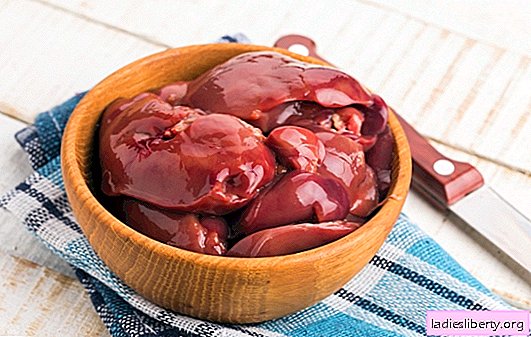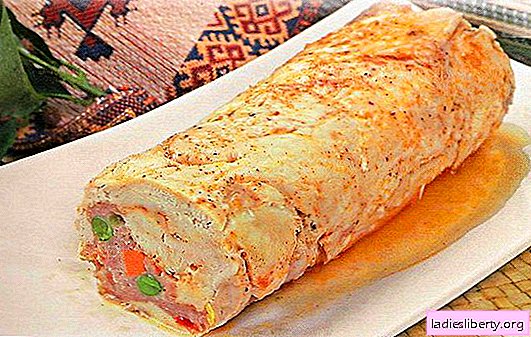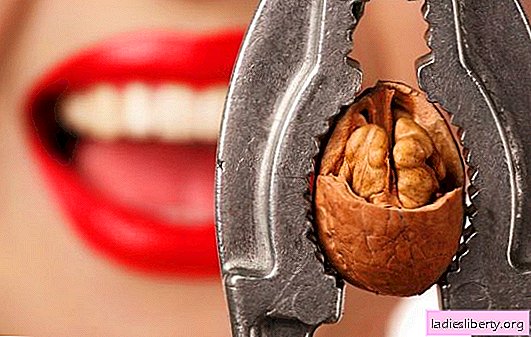
According to its useful properties, turkey liver bypasses a number of meat and offal delicacies, occupies an honorable place in the diet of dietary and healthy nutrition. You should know more about the benefits and possible harms of turkey liver.
How did turkey liver get on the Russian table?
A recognized delicacy for everyone - turkey meat has become one thanks to a long journey from the New World to Europe. The bird domesticated by the Indians was brought from native Mexico to Spain in the early 16th century. Later, merchants were delivered to France, then to England. Turkey came to Russia in the 17th century. Despite universal recognition, a thermophilic bird could be bred only in the south of Russia, therefore, it was not possible to breed a turkey en masse. Turkey has become the darling of the table for wealthy and wealthy women and has gained the status of a delicious product.
The attitude to turkey meat also spread to the turkey liver, which they began to eat at the same time as the appearance of poultry in the gastronomic field.
Is turkey liver a diet?
It is difficult to call turkey liver an ideal diet dish. The calorie liver of turkey (276 kcal / 100g) is significantly superior to chicken liver (140 kcal / 100 g). Consequently, chicken liver will fall into the diet menu for weight loss. But if necessary, gain weight - turkey liver - an indispensable product.
By the amount of vitamins contained, turkey liver is also inferior to its rival. However, the vitamin K contained in it, which plays a huge role in the metabolic processes in bone and connective tissues, makes the product indispensable. The benefits of turkey liver on the dining table speak a lot and not without reason.
What is expressed and for whom the benefits of turkey liver are important?
Turkey liver contains a lot of fats and proteins, this is due to the high calorie content and extraordinary usefulness.
The composition is characterized by a high content of vital vitamins, amino acids, micro and macro elements:
· K (potassium), Mg (magnesium), Cu (copper), Fe (iron), P (phosphorus), Na (sodium), Zn (zinc), Cr (chromium).
· The content in one product of the necessary elements responsible for salt and water-alkaline exchanges with a low sodium content and high iron content.
· The rich content of B vitamins.
· Participants in the full process of hematopoiesis, the lack of which in the body can cause the occurrence of anemia and insufficient heart function, accelerate metabolism, improve concentration.
Rich in Vitamin E.
· Being an excellent natural antioxidant, it fights toxins, harmful substances, participates in the process of cell regeneration, contributing to the rejuvenation of the whole body. In addition, it contributes to the production of female hormone, while maintaining female reproduction for a longer time.
Rich in Vitamin C.
· The content of ascorbic acid will positively affect the functioning of the heart and blood vessels. It will strengthen the immune system.
· Contains a large amount of vitamin A.
· Beneficial effect on the organs of vision, gives a healthy appearance to the skin and improves the condition of hair and nails.
High Vitamin K.
· Responsible for metabolism in muscle and bone tissue, it makes turkey liver a unique product.
· High content of mineral Se (selenium).
An indispensable helper of the thyroid gland for the absorption of iodine.
· Essential amino acids.
For example, a high content of tryptophan in the liver of a turkey will reduce stress susceptibility, normalize sleep, and cure eating disorders.
Turkey liver must be included in the menu:
1. To children.
A growing organism needs the necessary daily intake of vitamins, amino acids, proteins, fats, macro- and microelements. According to doctors, the liver of turkey should be fed to children from one year old.
2. Patients with diabetes.
These people can not eat many varieties of meat because of the high fat content. Turkey liver is a unique product that does not change the level of insulin and glucose in the blood. In addition, it compensates for the lack of nutrients in the body due to the lack of meat in the daily menu.
3. Pregnant.
The beneficial substances of the turkey liver will strengthen the child’s nervous system, and the mother will ensure a calm sleep and stability with frequent mood swings.
4. Suffering from iron deficiency anemia.
Due to the high iron content, which is easily absorbed by the body, turkey liver is recommended for patients with iron deficiency anemia.
5. Athletes.
The high protein content, the ability to strengthen muscle, bone, connective tissue and quick recovery after injuries make the turkey liver an obligatory component of the menu for athletes and people who model their body.
6. People of advanced age.
Being a storehouse of valuable properties, turkey liver is necessary to maintain the work, heart, blood vessels, joints, metabolic processes in the elderly.
However, it is precisely such a rich spectrum of useful properties in the composition that provides harm from taking turkey liver, of which the most important thing is to be known.
When does turkey liver harm?
It is the high protein content that can be harmful:
In case of kidney disease.
· If you have a disease, you should limit your intake of protein foods, which means that you can practically eliminate the turkey liver from your diet.
With gout.
· Due to the need for limited protein intake, turkey liver in this case is rarely and in moderation included in the diet.
With elevated cholesterol.
· Those suffering from high cholesterol, in order to avoid the development of atherosclerosis, are forbidden to eat any meat products. Turkey liver can be consumed in very small quantities.
With elevated hemoglobin levels.
· In such cases, it is necessary to abandon all foods with a high content of easily digestible iron, and hence the turkey liver.
· Individual intolerance / allergy.
· Very rarely, but still there is an allergy to turkey liver (a type of food allergy).
Despite all the value and usefulness of the product, even with the complete absence of contraindications, doctors recommend eating a serving of turkey liver no more than 180 g at a time and no more than 3-4 r per week.
Firstly, not all of their own diagnoses may be known.
And secondly, in the turkey liver itself, although lowered, it contains cholesterol accumulated from the functioning of this organ during the life of the bird.
An additional advantage of the product is the fact that among all cholesterol-containing meat products, turkey liver leads in the minimum cholesterol content (40-60 mg).
In addition, turkey liver is a unique useful product, with a lot of useful, valuable properties and a minimum of contraindications.
The culinary combination of turkey liver is so diverse that it will conquer the imagination of any skilled chef.
In the homeland of the world's favorite bird - Mexico, turkey liver is cooked with chocolate sauce, seasoning it with a lot of spices. Unfortunately, cooking the exact same sauce will fail due to the lack of necessary ingredients. But to use many cooking options is within reach.
Moreover, this is always a good reason - to please relatives and friends with a culinary masterpiece that is surprisingly useful for health and longevity.











